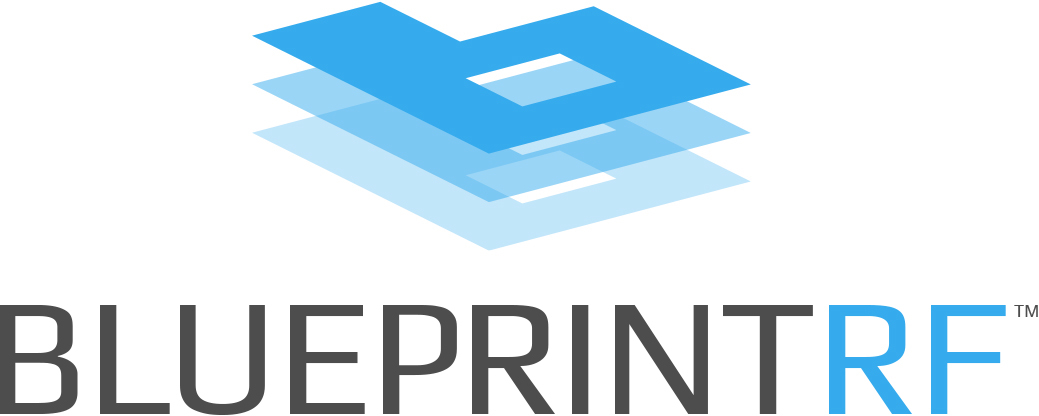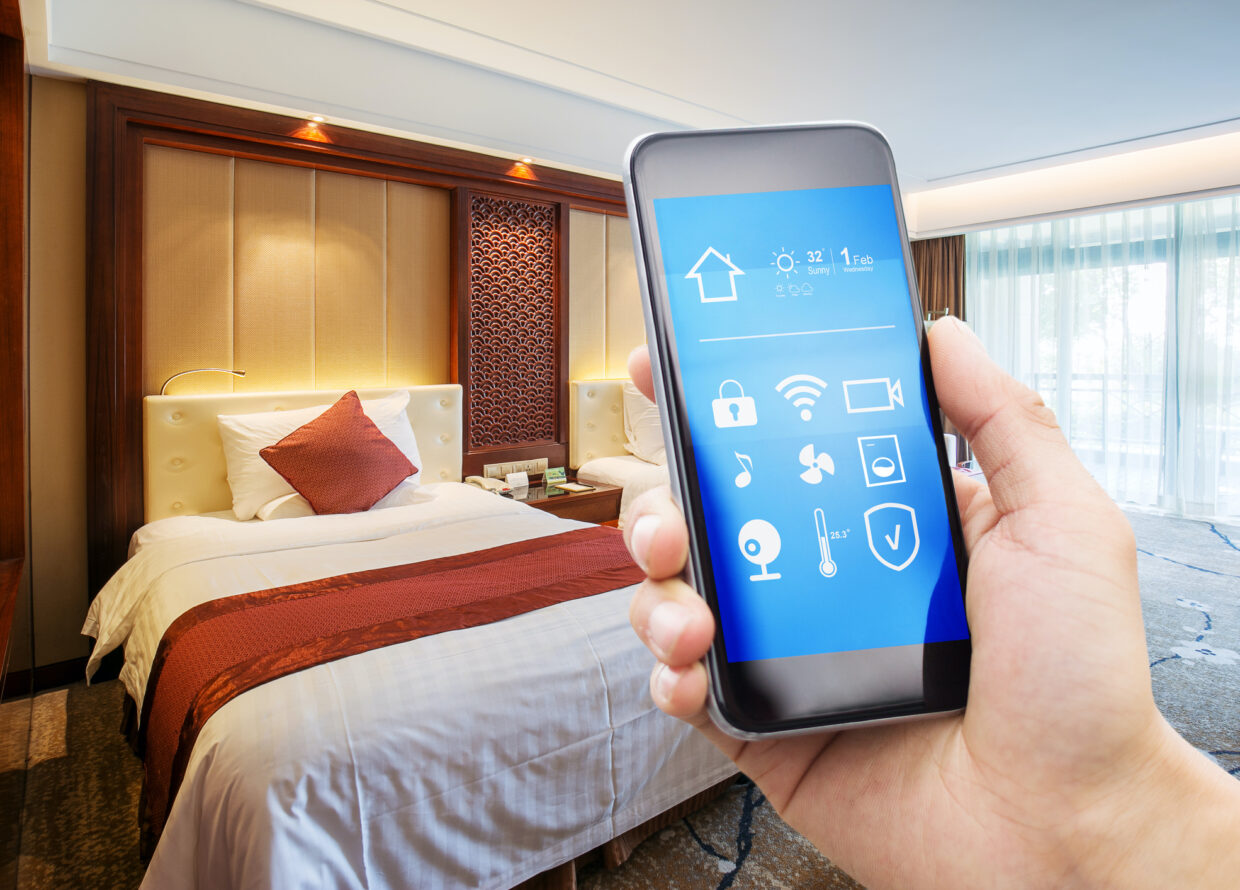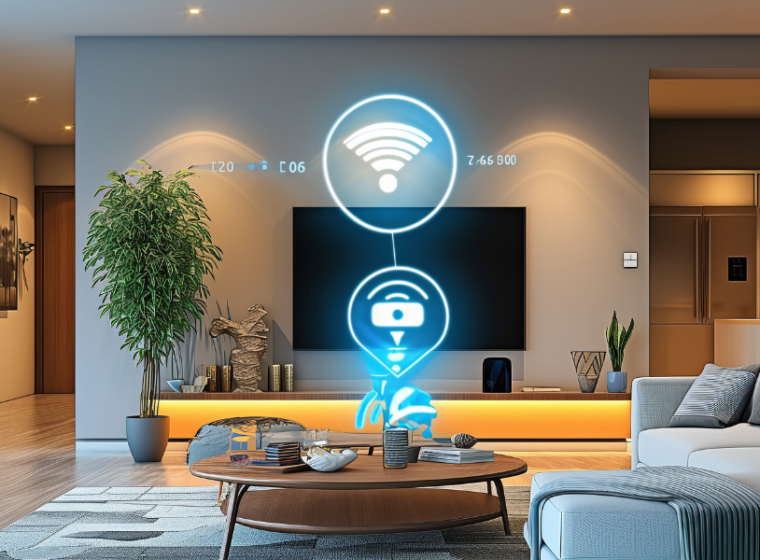The current technology trends in hospitality have advanced beyond just offering free WiFi, in-room entertainment, and providing USB chargers for smart devices. Hotels are now offering guests a technology-first approach to address their expectations for a fully connected, highly digital experience.
Hotel guests expect their stay to be an augmented extension of everything they can do at home and more. From customizable automations that are controlled by smartphones like dimming lights and adjusting room climate settings to voice-activated controls like ordering room service and making dinner reservations using Amazon Alexa and Google Home devices, guests desire a seamless experience powered by advanced technology.
Here are the top 10 trends in the hospitality industry for technology in 2022. If these advancements aren’t already in your hotel, consider upgrading to accommodate these trends soon to not fall behind.
1. Smart Rooms
What better way to make guests feel at home than to replicate many of the modern conveniences they are accustomed to at their own homes? Many guests have become used to the perks of their smart home, so hotels that boast those familiar accouterments are very enticing. These amenities are even more exciting for guests who don’t have access to these technologies at home.
Technologically advanced smart rooms can provide guests with both comfort and luxury. With nothing but their voice or a smartphone, guests dim and brighten room lights, adjust the temperature, open and close curtains, control their in-room entertainment system, and more. Since all of these devices are connected through high-bandwidth WiFi, it’s essential that your hotel network is powerful enough to sustain these technologies.
2. Predictive Smart Systems
The ability to forecast guest preferences holds a lot of power. Predictive smart systems utilize data analysis to determine each guest’s likes, dislikes, and personal tendencies through their guest profile. This can be applied to a wide array of use cases, such as knowing each guest’s preferred room temperature, whether they appreciate getting notifications on their phone about discounts at nearby restaurants and stores, and can even provide guests with customized suggestions for activities based on their interests.
Smart systems can also be used for predictive maintenance, allowing hoteliers to use sensor data to identify hazardous or wasteful trends, and alerting maintenance staff of the issue before a complete failure. For example, water lines can be monitored by IoT-enabled water meters that allow hotels to track their consumption and potential problems like a leaky faucet or running toilet. Predictive smart systems can save hotels thousands of dollars in costly repairs by way of simple preventative maintenance.
3. Automation
Artificial Intelligence (AI) and Machine Learning (ML) provide the means to both analyze data and then automatically put it into action. For example, your heating and cooling system may be automated to collect data on guest preferences and automate the setting of room temperatures. By automating the HVAC system, you can save on costs while also pleasing your guests with the exact temperatures they find comfortable during different times of the day.
Not only does automation provide customers with a great experience, but it can allow hotels to be more energy efficient. This automation extends to vacant rooms, too. When rooms are not occupied, hotels can save on energy costs by keeping them at a more moderate temperature. Before this automation, an employee was responsible for adjusting the thermostat upon the guest’s departure. Automating thermostat controls remove the potential for human error and save on energy costs by automatically adjusting the thermostat to a moderate temperature upon checkout.
Data gathered can be used to determine the time it takes a room to warm up to the correct temperature. This way the system knows precisely when to begin heating for the guest’s specific arrival time, ensuring the most comfortable and personalized guest experience.
4. Booking Technology Optimization
Reserving a hotel room today is faster and easier than ever before. Booking technology optimization uses mobile apps to make the process of reserving a room more efficient for the guest and hotel staff alike. By inputting nothing but a location, users are presented with a large number of filterable options for a place to stay. Potential guests can filter results by price, destination, amenities, and even the location of the room (facing the beach vs. the parking lot). These apps provide detailed information about different resorts and hotels that can give bookings a boost using pictures and well-written content about nearby attractions, hotel amenities, and unique experiences and activities.
5. Cloud-Based Technology
Cloud-based technology is a growing trend across the hospitality industry. When a hotel stores all its important information in one centralized and secure location in the cloud, it provides fast and efficient access to all employees. A hotel chain could have locations in two different countries, and both would be able to easily access the same cloud-based systems with any WiFi-connected device. Cloud technology can include full integration with hotel business systems like finance, scheduling, and auditing, allowing hotels to develop a comprehensive, connected property management system.
6. Cybersecurity
As the amount of information being transferred digitally increases, so too does the presence of cybercriminals.
Hotels handle a lot of private data about their business and their guests. It is paramount to also keep up to date on the latest cybersecurity best practices. Cybersecurity is becoming a more popular topic by the day, as data breaches become more common due to the amount of personal information people put online.
Hospitality apps that consume and transmit guests’ data need to account for cyber-attacks through high levels of security and verification.
7. Smart Recognition Technology
Just as you can access many smartphones, computers, and tablets with facial recognition, this can also be implemented in a hotel. Smart recognition technologies are highly advanced and accurate, and it is the fastest way to verify someone’s identity. This trend is sure to continue in the hospitality industry, with both staff and guests gaining access through facial recognition.
8. Specialized Software Systems
Hotels need a lot of different systems to function and meet operational needs.
Tasks such as check-in, booking, reporting, and scheduling all need software to efficiently perform. A hotel’s entire workflow can be optimized with custom software that rolls all these tools into one integrated solution. These types of SaaS (Software as a Service) solutions are becoming increasingly prevalent, and thanks to mobile apps these systems can be accessed on any WiFi-connected device.
9. Personalized Guest Experiences
There are a lot of hotel options out there. The hotels that stand out in 2022 and beyond will be the ones that provide guests with a highly personalized experience. People want to feel special, so catering to their entire experience is an important component of a lasting impression. A simple welcome email with a questionnaire after a guest has booked a room is a great way to gain more information to personalize their experience. Guests may even be willing to share links to their social media pages where a hotel can gather more information on their preferences.
10. Check-In Automation
Check-in automation is a hot trend in the hospitality industry that isn’t going away any time soon. Allowing guests to check-in from their smartphone, even from the parking lot, saves a lot of time for both the guest and front desk staff.
In a post-pandemic world in which safety is a top priority, there are still concerns about keeping social distance, and check-in automation is another great way to respect this. Additionally, with electronic keycard technology, guests can get a digital room key sent to their smartphone after using it to check-in. Digital room keys are a great way to reduce extra spending on physical key cards that are often lost or not turned in by guests upon checkout. Digital room keys also free up hotel staff from having to program physical room keys, allowing them to spend more time engaging with guests.
WiFi Powers New Trends in the Hotel Industry
The number of new technologies in the hospitality industry is vast, and this list was merely a taste of what is in store for 2022. The many themes center around automation, smart features, and a whole lot of machine learning.
The best thing about all these technologies is they can seamlessly interact because every device is connected to a WiFi network that allows them to talk to one another. This creates the Internet of Things (IoT), which is becoming a welcome presence in our daily lives.









